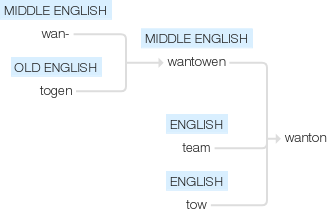Wanton
Middle English wantowen ‘rebellious, lacking discipline’, from wan- ‘badly’ + Old English togen ‘trained’ (related to team and tow1).
wiktionary
From Middle English wantoun, wantowen, wantoȝen, wantowe(“uneducated; unrestrained; licentious; sportive; playful”), from wan-(“not, un-, mis-”) + towen, i-towen(“educated”, literally “towed; led; drawn”), from Old English togen, ġetogen, past participle of tēon(“to train, discipline”), equivalent to wan- + towed.
etymonline
wanton (adj.)
early 14c., wan-towen, "resistant to control; willful," from Middle English privative word-forming element wan- "wanting, lacking, deficient," from Old English wan-, which was used interchangeably with un- (1), and is cognate with Dutch wan- (as in wanbestuur "misgovernment," wanluid "discordant sound"), Swedish and Danish van-, from Proto-Germanic *wano- "lacking," from PIE *weno-, suffixed form of root *eue- "to leave, abandon, give out." Common in Old and Middle English, still present in 18c. glossaries of Scottish and Northern English; this word is its sole modern survival.
Second element is Middle English towen, from Old English togen, past participle of teon "to train, discipline;" literally "to pull, draw," from Proto-Germanic *teuhan (source also of Old High German ziohan "to pull," from Proto-Germanic *teuhan; see tug (v.)). The basic notion perhaps is "ill-bred, poorly brought up;" compare German ungezogen "ill-bred, rude, naughty," literally "unpulled." Especially of sexual indulgence from late 14c. Meaning "inhumane, merciless" is from 1510s. Related: Wantonly; wantonness.
As Flies to wanton Boyes are we to th' Gods, They kill vs for their sport. [Shakespeare, "Lear," 1605]
wanton (n.)
"one who is ill-behaved," mid-15c., especially "lascivious, lewd person" (1520s), from wanton (adj.).
wanton (v.)
"to revel, frolic unrestrainedly," 1580s, from wanton (adj.). Related: Wantoned; wantoning.
